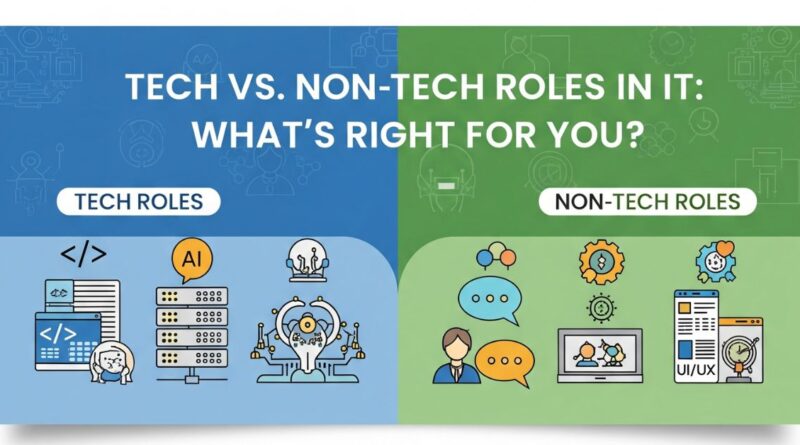💡 Tech vs. Non-Tech Roles in IT: What’s Right for You?
💡 Tech vs. Non-Tech Roles in IT: What’s Right for You?
Introduction: Understanding the IT Landscape
The Information Technology (IT) industry is booming in 2025, opening up a world of opportunity for both tech-savvy professionals and those who excel in other domains. Many freshers, however, remain unsure of which path to pursue: a technical role that involves hands-on coding and system building, or a non-technical role that leverages communication, analytical, or managerial skills.
This blog post dives deep into the tech vs non-tech roles in IT dilemma. We’ll examine the roles, compare skillsets, analyze salaries, and explore career paths to help you decide: Which IT role is right for me? Whether you’re a student about to graduate or a career switcher, this guide will give you clarity and direction for your journey into the tech world.
🔍 What Are Tech and Non-Tech Roles in IT?
The IT ecosystem thrives on diversity—not just cultural or demographic diversity, but also diversity in job functions. Broadly, IT roles can be split into two categories:
Technical Roles:
- Involve coding, systems management, infrastructure, cloud computing, or cybersecurity.
- Typically require a background in Computer Science, IT, or Engineering.
- Demand hands-on experience with software development tools.
Non-Technical Roles:
- Focus on planning, analysis, design, user experience, client support, marketing, or sales.
- May not require programming knowledge.
- Are essential to ensure smooth execution of IT projects and business operations.
This distinction is not rigid. Today, many non-tech roles use tech tools (like Excel, Power BI, or Jira), and many tech roles require soft skills like communication and leadership. It’s common to see overlaps, especially in startups where responsibilities often merge.
🛠️ Key Skills Required for Tech Roles
To thrive in a technical role, consider building the following skillset:
- Programming Languages: Python, Java, JavaScript, C++, etc.
- Data Structures & Algorithms: Core to solving coding problems and cracking interviews.
- Version Control Systems: Git, GitHub, Bitbucket for code management.
- Cloud Platforms: AWS, Azure, GCP.
- Development Frameworks: React, Angular, Node.js, Django.
- Database Management: SQL, MongoDB, Firebase.
- System Design: Crucial for senior-level roles or scaling applications.
Learning Resources:
- LeetCode, HackerRank for coding practice.
- GitHub for contributing to open-source projects.
- Scaler, CodeAcademy, Coursera, Udemy for structured learning.
Certifications to consider:
- AWS Certified Developer
- Google Associate Cloud Engineer
- Microsoft Azure Fundamentals
- Meta Front-End Developer
🤝 Key Skills Required for Non-Tech Roles
Not everyone in IT needs to write code. Here are the essential skills for excelling in non-tech IT roles:
- Analytical Thinking: Crucial for Business Analysts and Marketing Analysts.
- Project Management: Agile, Scrum, Kanban methodologies are a must for PM roles.
- Tools: Jira, Trello, Figma, Notion, Excel, Tableau, Power BI.
- Communication: Written and verbal communication for stakeholder management.
- Marketing & SEO Knowledge: For roles in growth marketing and digital analytics.
- Customer Empathy: Essential in UI/UX design and customer success roles.
Learning Resources:
- Google Project Management Certificate (Coursera).
- Digital Marketing by Google (Skillshop).
- Business Analysis on LinkedIn Learning or Simplilearn.
- Introduction to UI/UX Design (Coursera).
Certifications to consider:
- PMP (Project Management Professional)
- Certified Scrum Master (CSM)
- Google Analytics Certification
- HubSpot Inbound Marketing Certificate
🔄 Comparison: Tech vs. Non-Tech Roles in IT
Here’s a side-by-side comparison of technical and non-technical roles:
| Feature | Tech Roles | Non-Tech Roles |
|---|---|---|
| Requires Coding | ✅ Yes | ❌ Rarely |
| Skill Focus | Technical, Analytical | Communication, Management |
| Career Flexibility | High within tech | High cross-functionally |
| Tools Used | IDEs, Git, Docker | Jira, Excel, Figma |
| Degree Requirement | Often CS/IT preferred | Open to all degrees |
| Learning Curve | Steeper, longer setup | Moderate, faster entry |
| Collaboration | Often team-based | Constant cross-functional |
📈 Career Growth in Both Paths
Both paths offer room for rapid growth. Let’s see how:
Technical Career Progression:
- Junior Developer → Software Engineer → Senior Developer → Tech Lead → Engineering Manager → CTO
- QA → SDET → Automation Architect → QA Manager → Director of Quality Assurance
- Data Analyst → Data Scientist → Data Engineer → Analytics Manager
Non-Technical Career Progression:
- Support Analyst → Project Manager → Program Manager → Delivery Manager → COO
- Business Analyst → Product Owner → Product Manager → VP of Product
- HR Executive → Talent Acquisition Lead → People Operations Manager
Lateral movement: Many professionals switch between paths based on interest. For example, a QA tester might become a product manager, or a business analyst might transition into data science after acquiring technical skills.
🧭 Which IT Role Is Right for Me?
Ask yourself these questions:
- Do I enjoy solving technical problems and writing code? → Tech Role
- Do I enjoy working with people, organizing tasks, and solving business problems? → Non-Tech Role
- Am I more comfortable with tools like Excel and Figma than with IDEs? → Non-Tech Role
- Am I okay with constant learning and debugging? → Tech Role
- Do I want to understand customer behavior and market trends? → Non-Tech Role
- Do I enjoy logical puzzles and automation? → Tech Role
Remember, both paths require dedication, curiosity, and a learning mindset.
💼 High-Demand Technical and Non-Technical Jobs in IT
Trending Tech Jobs for 2025:
- Front-End Developer
- Back-End Developer
- Full-Stack Developer
- DevOps Engineer
- QA Automation Tester
- Data Analyst / Data Scientist
- Cloud Support Engineer
Trending Non-Tech Jobs for 2025:
- Business Analyst
- UI/UX Designer
- IT Support Executive
- Project Coordinator
- Product Manager
- Technical Recruiter
- Digital Marketing Executive
These roles fall under the umbrella of in-demand tech jobs 2025 and best tech roles for freshers 2025. As per market analysis, both tech and non-tech roles are projected to grow significantly in India and globally.
💰 Salary Comparison: Tech vs. Non-Tech Roles in India
| Role | Average Entry-Level Salary (INR) |
| Software Developer | ₹6–10 LPA |
| QA Engineer | ₹4.5–7 LPA |
| Data Analyst | ₹5–8 LPA |
| Business Analyst | ₹4–6 LPA |
| IT Support | ₹3.5–5 LPA |
| UI/UX Designer (entry-level) | ₹4–6 LPA |
| Project Coordinator | ₹4–7 LPA |
High-paying IT jobs for freshers often fall under DevOps, Cloud, and Data fields, while Product Management roles in the non-tech side become lucrative over time.
🎓 How to Start Your Career in IT
For Technical Aspirants:
- Choose a tech stack: Frontend (React, JS), Backend (Java, Python), or Full-Stack.
- Master DSA and system design.
- Build and publish 3–5 solid projects.
- Participate in coding contests or hackathons.
- Get cloud certifications (AWS, Azure).
For Non-Technical Aspirants:
- Choose a focus area: PM, BA, UI/UX, Marketing.
- Learn core tools (Jira, Excel, Figma, Power BI).
- Take domain-specific certifications.
- Build a portfolio or case study.
- Network with professionals on LinkedIn.
Entry-Level IT Jobs 2025 Platforms:
- LinkedIn Jobs
- Naukri
- Internshala
- CutShort
- AngelList (startups)
- Company career pages
🌐 Where to Find These Jobs
Top Platforms:
- Naukri.com
- Hirect (chat-based startup hiring)
- Internshala (great for college students)
- Tech job boards: CutShort, AngelList
Resume Tips:
- Tailor your resume to the job title.
- Include certifications, tools, and relevant experience.
- Add a strong LinkedIn summary and showcase your portfolio.
🔁 Can You Switch Between Tech and Non-Tech?
Yes, and many professionals do it successfully!
From Non-Tech to Tech:
- Learn to code (Python or Java).
- Understand system basics (OS, networks).
- Take developer bootcamps.
- Transition into roles like QA, SDET, or even software dev.
From Tech to Non-Tech:
- Move into Product or Project Management.
- Leverage domain knowledge to become a Business Analyst.
- Learn soft skills, management, and business strategy.
Switching takes effort, but it’s absolutely possible in today’s dynamic IT environment. Many unicorn startup founders started as tech developers and became business/product leaders.
🧠 Final Thoughts: Tech or Non-Tech—Both Are Valuable
Tech vs non-tech is not a battle. It’s a spectrum of skills and interests. In the ever-evolving IT world, there’s space for all kinds of thinkers: builders, planners, analysts, designers, and communicators.
Make your decision based on:
- Interest and passion
- Growth prospects
- Learning willingness
Explore, experiment, and don’t fear change. As the saying goes in tech: “The only constant is learning.”
Follow us for more Updates: Telugu Careers Hub




